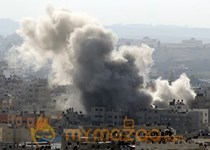An Israeli man delivering food to soldiers Tuesday at the border of the Gaza Strip was struck and killed by mortar fire, becoming the first Israeli death in more than a week of fighting between the country’s army and Hamas militants.
Police spokesman Micky Rosenfeld told The Associated Press that the man, in his 30s, was at the Erez Crossing with the Gaza Strip.
The news of the death came around the same time Israeli Prime Minister Benjamin Netanyahu vowed to exert "great force" against Gaza's Hamas rulers after the Islamic militants rejected a truce agreement.
In a televised address, Netanyahu said "Hamas chose to continue fighting and will pay the price for that decision."
Gaza militants fired close to 100 rockets since the morning, when the truce was to have begun, the Israeli military said. In the evening, a quick barrage of 40 rockets fell over the course of a few minutes. Palestinian health officials say 194 Palestinians were killed and more than 1,400 over the past week.
Israeli officials said that the truce proposed by Egypt's Foreign Ministry had been accepted by the cabinet shortly after it was due to take effect Tuesday at 9 a.m. local time (2 a.m. Eastern Time). Less than half an hour later, a senior Hamas official told The Associated Press that the group had rejected the proposal, claiming that Cairo had not consulted them.
"We did not receive any official draft of this Egyptian proposal," Sami Abu Zuhri said, adding that the plan, as is, was "not acceptable."
Israel’s military later said it resumed airstrikes on the Gaza Strip Tuesday after Hamas continued to fire rockets throughout the country.
Israeli Prime Minister Benjamin Netanyahu and Defense Minister Moshe Yaalon "directed the military to act with intensity against terror targets in Gaza," said an Israeli official who spoke on condition of anonymity because he was not authorized to discuss the decision with the media.
A senior Israeli military official suggested the Egyptian plan hadn't collapsed entirely.
He said that even though Israel resumed bombing Gaza, it would stop if Hamas accepts the truce and that the coming hours are critical. If not, the military has a plan in place to significantly amp up its offensive, including a possible ground operation, said the official who spoke on condition of anonymity because he was discussing military strategy.
On Tuesday evening, rocket sirens and blasts were heard in Tel Aviv, as Israel's "Iron Dome" missile defense system intercepted two rockets, according to the Israel Defense Forces Twitter account.
In addition, the military said three rockets were fired at the southern city of Eilat. The military did not immediately know who was behind the rocket fire. Previous rocket attacks on the city have come from radical Islamic militants in the neighboring Sinai Peninsula.
Under the Egyptian plan, proposed late Monday, a 12-hour period of de-escalation was to begin at mid-morning Tuesday. Once both sides agree to halt hostilities, they would negotiate the terms of a longer-term truce.
But the armed wing of Hamas said the Egyptian plan "wasn't worth the ink it was written with." Reuters reported that a statement on the website of the al-Qassam Brigades called the proposal "an initiative of kneeling and submission" before vowing that "our battle with the enemy continues, and will increase in ferocity and intensity."
Word of Hamas' rejection of the cease-fire came hours after State Department officials told The Associated Press that Secretary of State John Kerry had opted not to travel to the region on his way back to Washington from talks regarding Iran's nuclear program in Vienna. There was no immediate word of whether Kerry would reconsider his decision in light of the cease-fire's rejection.
The militant group appeared to be holding out for better cease-fire conditions, with senior officials saying the current proposal offers no tangible achievements, particularly on easing a border blockade of Gaza enforced by Israel and Egypt.
Osama Hamdan, a key aide to top Hamas leader Khaled Mashaal, told The Associated Press that Hamas has a series of demands, including the release of Hamas activists arrested by Israel in the West Bank in recent weeks. Hamas also wants to be recognized by Egypt as a partner in any truce efforts.
Another Hamas official, Moussa Abu Marzouk, sounded more conciliatory, saying internal consultations on the cease-fire proposal are continuing.
Hamas officials are weary of promises by Egypt and Israel to ease the border blockade. Such promises were also part of a truce that ended more than a week of fighting in 2012, but were quickly broken as violence flared again.
An easing of the blockade of the coastal strip is key to the survival of Hamas.
Before the outbreak of the latest round of fighting, the militant group found itself in a serious financial crisis because a particularly tight closure by Egypt had prevented cash and goods from coming into the strip through hundreds of smuggling tunnels under the Gaza-Egypt border.
Israel launched an offensive July 8, saying it was a response to weeks of heavy rocket fire out of Hamas-ruled Gaza.
Ahead of the Egyptian announcement, there appeared to be no slowdown in the fighting, with Hamas for the first time launching an unmanned drone into Israeli airspace that was shot down.
The violence followed the kidnappings and killings of three Israeli teenagers in the West Bank last month, as well as the subsequent kidnapping and killing of a Palestinian teenager in an apparent revenge attack, along with Israeli raids against Hamas militants and infrastructure in the West Bank.
Israeli officials have said the goal of the military campaign is to restore quiet to Israel's south, which has absorbed hundreds of rocket strikes, and that any cease-fire would have to include guarantees of an extended period of calm. Hamas officials say they will not accept "calm for calm."
With the death toll mounting, both sides have come under increasing international pressure to halt the fighting.







